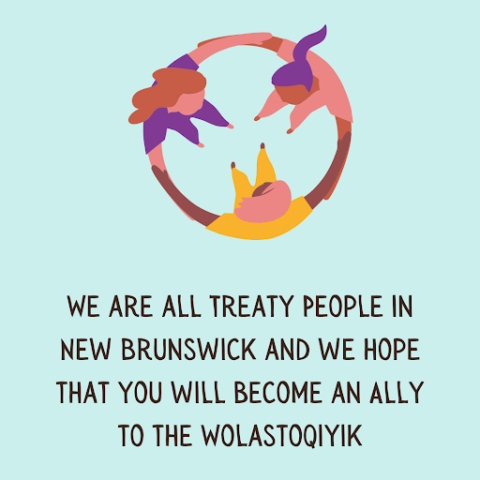We Are All Treaty People
Canada’s National Day For Truth and Reconciliation should mean a commitment to doing the work of being an ally to Indigenous Peoples every day of the year
Canada’s National Day For Truth and Reconciliation should mean a commitment to doing the work of being an ally to Indigenous Peoples every day of the year.
Today (Thursday, Sept. 30), is the first National Day for Truth and Reconciliation. September was chosen as it’s the time of year Indigenous children were taken from their families and sent to residential schools.
The day honours the lost children and survivors of residential schools and is intended for recognition and reflection upon the intergenerational trauma inflicted on survivors, their families, and their communities.
The Conservation Council of New Brunswick urges our members, staff, and supporters to spend this day to start or continue learning about Canada’s past and present treatment of this land’s Indigenous Peoples. For settlers, it’s a time to think about how to meaningfully participate in reconciliation each day of the year.
There are no spectators in reconciliation. We must all do our part in this hard yet crucially important work. That means taking the time ourselves to learn about Indigenous history, food and land security, clean drinking water, and basic human rights in Indigenous communities.
There are resources to help in this journey.
The Truth and Reconciliation Commission ran from 2008 to 2015 and provided those directly or indirectly affected by the legacy of the Indian Residential Schools policy with an opportunity to share their stories and experiences. The National Centre for Truth and Reconciliation (NCTR) is the permanent archive for the statements, documents and other materials the Commission gathered, and its library and collections are the foundation for ongoing learning and research.
The Wolastoqey Nation in New Brunswick’s Ally Toolkit offers invaluable resources to better understand the experiences of Indigenous peoples, through readings, podcasts and music, and provides a guide for settlers to use their privilege to speak up and act on reconciliation each day.
We must understand what Indigenous people in New Brunswick and across Canada have been through. We must acknowledge the disproportionate impact the climate and nature crises have on Indigenous lives and livelihoods. We must speak up and demand our government implement the Calls to Action from the Truth and Reconciliation report.
More Resources
More Resources
- Truth and Reconciliation Commission of Canada Reports and Calls to Action.
- National Centre for Truth and Reconciliation Imagine a Canada, Decolonizing Lens, and NCTR Dialogues.
- Read 21 Things You May Not Have Know About the Indian Act by Bob Joseph.
- Review The Yellowhead Institute’s Calls to Action on Accountability: A 2020 Status Update on Reconciliation and their 5×5 Review: How do we Solve Structural Racism?
- Browse the Wolastoqey Nation’s Ally Toolkit.
- Learn about the Peskotomuhkati Nation on the Skutik River.
- Visit the Passamaquoddy-Maliseet Language Portal for the 19,000-entry Passamaquoddy-Maliseet dictionary and extensive archive of videos and conversations.
- Search this interactive map to learn which Indigenous groups’ traditional territories you live on, what languages have been spoken there, and what treaties apply to your area.
- Read “Whose Land Is It Anyway? A Manual For Decolonization” by Peter McFarlane and Nicole Schabus.
- Listen to the Mbwaach’idiwag podcast episode “Colonial Problems Rebranded as Indigenous Issues.”
- Browse the Think Indigenous podcast and enjoy an episode.
- Sen. Murray Sinclair on “How can Canadians can work toward reconciliation.”
Land Acknowledgement
As a provincial organization, the Conservation Council of New Brunswick acknowledges that it carries out its work on the traditional unceded territory of the Wolastoqiyik, Mi’kmaq and Peskotomuhkati peoples. This territory is covered by the “Treaties of Peace and Friendship” which these nations first signed with the British Crown in 1726. The Conservation Council commits to continue to work closely with the Nations on whose unceded territory we work and live.

